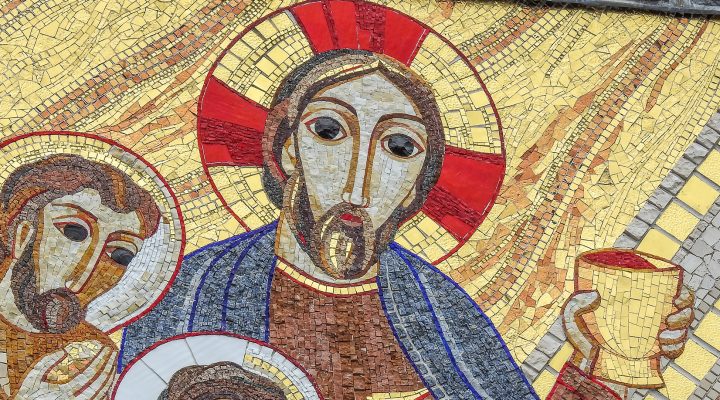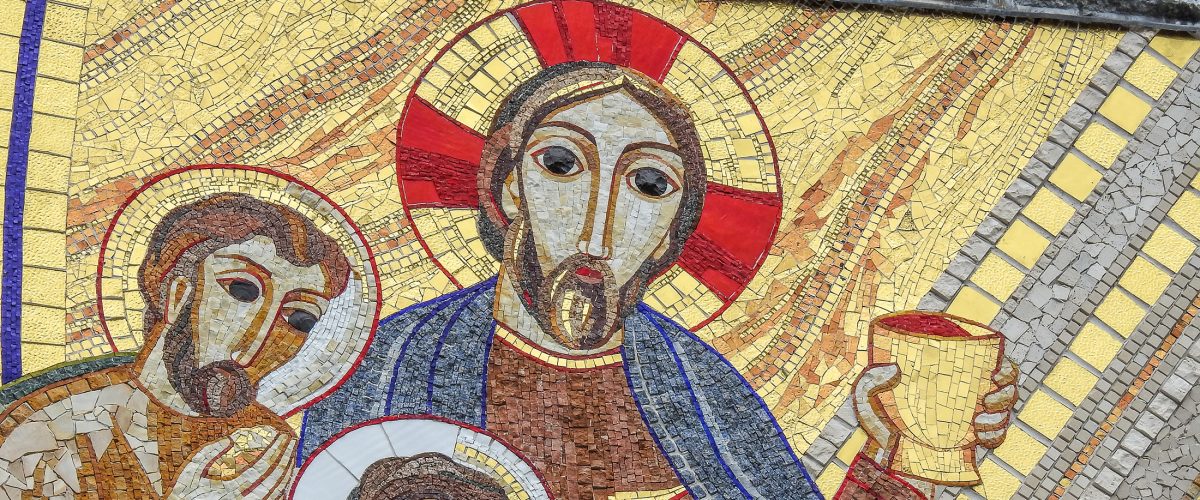Author’s note: On Oct. 22, I was privileged to preach at a convocation celebrating the 25th anniversary of the School of Divinity at Wake Forest University. I pass it along in this Reformation week.
“They have no wine,” his mother said to the Son of God, when the cabernet ran out at the wedding in Cana of Galilee, on the edge of the kindom of God.
But Jesus of Nazareth wasn’t getting involved in that nuptial catastrophe.
“Woman,” he says to the Blessed Virgin Mary, “what do you and I have to do with this? My hour has not come.”

Bill Leonard
But Mother Mary refuses to take no for an answer, even from the Word of God made flesh. “Do whatever he tells you,” she says to the servants.
And, whether his hour has come or not, Jesus is committed. Raise your hand if your mother has ever ordered you to do something you didn’t want to do. The rest of you are lying!
So, the one whom the Nicene Creed calls “God from God, Light from Light, true God from true God,” obeys his mother and improvises with six stone water jars — capacity 20 to 30 gallons. He orders them filled “to the brim” with clear, fresh water. And in a twinkling, something wondrous happens.
“Draw some off,” Jesus tells them, and “take it to the caterer” who, not knowing where the liquid came from, takes one small sip, and then perhaps a larger second, smiles broadly (I’m guessing here) and says: “Usually we serve the really good wine first and wait until the guests are a little drunk (the NRSV translation) and then serve the stuff we picked up at the convenience store” (my 2024 translation).
Turning spirits to spirituality, the guy adds: “But you have saved the best until last.”
That brief, powerful phrase carries us from familial prickliness through water into wine, to the kin-dom of God, God’s New Day in the world; a story filled to the brim with grace and frivolity, irony and gospel, vintage Jesus all the way.
“Mother Mary seems to know, even before her son does, that sometimes where grace is concerned you must improvise.”
Mother Mary seems to know, even before her son does, that sometimes where grace is concerned you must improvise. To say that we are free, free to live by faith and grace alone, does not mean we fail to prepare, study, reflect or struggle. It means we never can prepare enough. All the education in the world, all the implicit doctrines, creeds or constitutions we pledge to follow never can ensure we won’t have to improvise. Life and faith can readily thrust us into situations for which we never could prepare even if we knew in advance it was going to happen.
The Cana story concludes with John’s comment: “This deed at Cana-in-Galilee is the first of the signs by which Jesus revealed his glory and led his disciples to believe in him.” The disciples were surely pleased that they had chosen to follow such a hospitable prophet.
But John won’t let the Gospel rest on wine and wedding receptions, turning instead to Jesus, danger and dissent: “As it was near the time of the Jewish Passover, Jesus went up to Jerusalem. There he found in the temple the dealers in cattle, sheep and pigeons, and the moneychangers, scattering their coins. Jesus made a whip of cords.”
Again, Jesus improvises, the one who changed water to wine made a whip of cords and drove out the infamous “moneychangers.” Once Jesus learned to improvise, he couldn’t stop — life (and gospel) wouldn’t let him.
John is the only one of the four Gospels that puts the moneychanger story at the beginning of Jesus’ ministry, not at the end. But more significant is that John pairs the wedding feast with the cleansing of the temple.
In the book God and Empire, John Dominic Crossan says Jesus’ message of liberation was a prophetic protest against “religious cooperation with … imperial control, … a permanently valid protest demonstration against any capital city’s collusion between conservative religion and imperial violence at any time and in any place.”
Jesus says, “You must not turn my Father’s house into a market.” Sound familiar in 2024?
The Cana wedding is “the first of Jesus’ miracles.” Today we say it was the beginning of a Reformation. Why? First, because Ecclesia semper Reformanda, the church is always reforming, and it needs one right now.
Second, if the wedding at Cana marks God’s New Day in the world, then, we Protestants say, Martin Luther’s posting of 95 theses on the church door in Wittenberg, Germany, Oct. 31, 1517, marked yet another sign of God’s New Day, calling the church to rethink its identity, its foundation, its mission in the world.
Third, 507 years after that landmark moment, we say the church of the here and now — at least in the land of the free and the home of threats against judges, jurors, FEMA workers, librarians and school board members — is desperate for reformation.
“Today’s churches live, like Jesus and Martin Luther, somewhere between celebration and dissent.”
The ripple effects of that reformation mean today’s churches live, like Jesus and Martin Luther, somewhere between celebration and dissent, between the wedding at Cana and the indulgence sellers. Luther’s Reformation starts with celebration: The just shall live by faith; the priesthood of all believers; the end of clerical celibacy. Remember: Martin Luther was an ex-priest who married Katherine von Bora, an ex-nun and together they had six children, and that if nothing else is reformation.
Celebration soon turns to dissent. Jesus turned on the moneychangers; Luther turned on the indulgence sellers, hucksters selling documents by which normal sinners could purchase grace drawn on the storehouse of merit — good works generated by the saints who didn’t need all that holiness for salvation, so it could be transferred to those who needed a little more to get themselves or their relatives out of purgatory. One of Luther’s theses declared, “The saints have no extra credits.”
In Dissent in American Religion, the late historian Edwin S. Gaustad writes, “Dissent cannot be understood simply in terms of whines against oppression, resistance to organizational corruption, demurrers against the affirmations of others.” Dissenters, Gaustad insists, are more than “merely noisy naysayers.” Instead, “the dissenter is a powerful if unpredictable engine in the service of a cause.”
Today, let us say that at their best, and their messiest, dissenters are a prophetic witness to insensitivities in church and culture and agents of celebration for the possibilities of reformation. Gaustad admits that “history hones dissent to a fine edge: sharp, severe and unyielding.”
“Dissent is concerned with change, to right the wrong, to correct the injustice. But that may not happen all at once.”
That’s an extremely crucial point. At its best, dissent is concerned with change, to right the wrong, to correct the injustice. But that may not happen all at once. The moneychangers and indulgence sellers kept hawking their wares long after Jesus and Luther had their say.
Dissent for the sake of justice doesn’t usually begin with change, it begins with witness, a dissenter consumed with a “zeal for God’s house,” the breaking of God’s New Day in the world. Sometimes the most we can do is “give a witness” with our dissent and hope for reformation aided by others who long for social and spiritual transformation. It is time for such a witness.
They will come, those moments, in some dark night or early morning when we are all alone and called to respond to situations our mother couldn’t have warned us about. And neither Donald Trump nor Kamala Harris, Tucker Carlson nor Joy Reid, Franklin Graham nor Aretha Franklin can tell us what to do. There we are in an emergency room or a country full of imminent pain and instant chaos and there’s no time to organize a response; only time to improvise beyond phone texts or proof texts, long-range plans or short-term solutions. We improvise grace by sola fide, faith alone.
In the quarter century of the Wake Forest Divinity School, we’ve often had to improvise. Sept. 11, 2001, comes immediately to mind. It was a Tuesday, chapel was at 11, but before that time, the planes had hit the World Trade Towers and the Pentagon. Our guest preachers that day were Nancy Sehested and Linda Weaver Williams, Baptist ministers extraordinaire who quickly revised their plans, improvising a time of prayer and reflection without platitudes or false bravado. Before we knew it, the small Davis Chapel was filled with divinity and undergraduate students, the latter seeking sanctuary without knowing others were gathered.
When it ended, I stood to offer a benediction, only to hear myself saying, “In light of today’s events, there will be a Communion service at 4 p.m. in Wait Chapel.” Again we improvised, as university chaplains joined religion and divinity faculties in preparing and distributing bread and cup with stations across the front of the chapel.
We invited Professor Jill Crainshaw to preach, and I shall never forget what she did. Standing behind this very Communion table, she lifted shards of matzah flatbread and began to break them in her hands, fragments flying across the table and dropping to the floor, confessing the brokenness present in the world, in New York and across the American nation, including this very room. And then we came to the table, an estimated 800 of us, some weeping, others in shock, all caught up in a national tragedy. Crainshaw improvised the real presence of the Christ amid the brokenness of the moment. Grace in the midst of desperation, an audacious witness to a sustaining moment of hope.
“To improvise grace is to take a chance, to risk everything on faith.”
To improvise grace is to take a chance, to risk everything on faith. You gamble, with only moments to spare, that something will be right, that the Spirit will inspire and it won’t hurt more than it helps. Does that mean the gospel is relative? No, it means life, including Christian life, is unpredictable.
And the wisdom to know when to stand on unshakable convictions and when to grab for all the ambiguity you can get is what Holy Spirit is about. It is also to know moments of abject terror, for sometimes even in our best efforts to help nothing seems to change, and grace is a long time coming.
Where will God’s New Day take American churches exploring old/new ways of ministering as agents of justice, reconciliation and compassion in a divided church, state, nation, dangerous world? When the rhetoric of the public square nurtures bigotry, cynicism and downright meanness, can we be dissenting witnesses to the new wine of grace, care and conscience?
Yet amid that sober condition, we can remember the days when water turned to wine, when the Spirit fell like fire, days when the church seemed drunk with the divine explosion. So, in times of light or darkness, formation and reformation, consensus and dissent, we hold on to the God who saves the best until last, and who saves even the last ones best. Alleluia!
Bill Leonard is founding dean and the James and Marilyn Dunn professor of Baptist studies and church history emeritus at Wake Forest University School of Divinity in Winston-Salem, N.C. He is the author or editor of 25 books. A native Texan, he lives in Winston-Salem with his wife, Candyce, and their daughter, Stephanie.
Related article:
From the Protestant Reformation to Columbia University, some thoughts on protests | Opinion by Patrick Wilson


